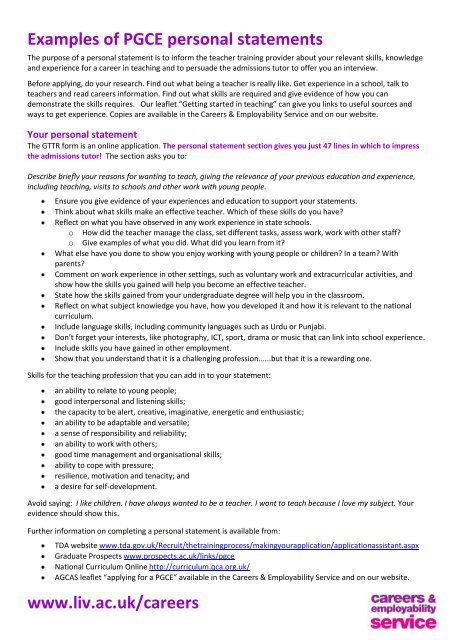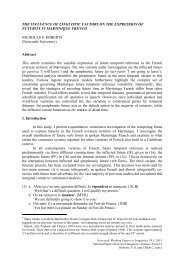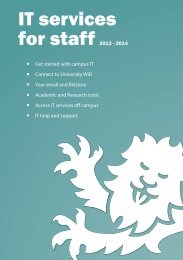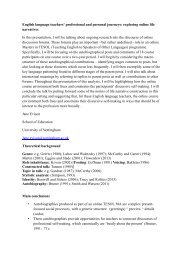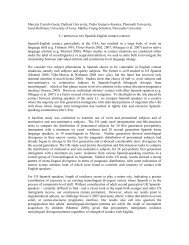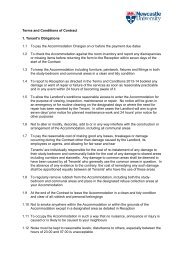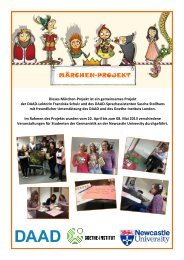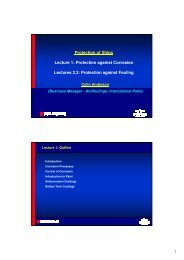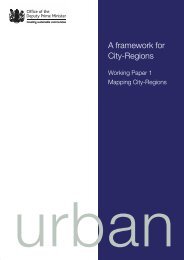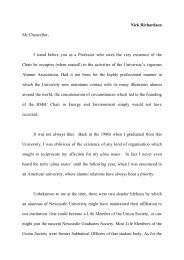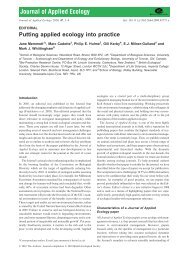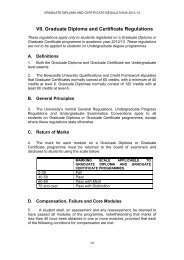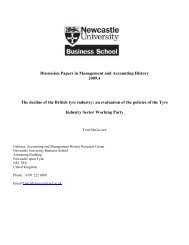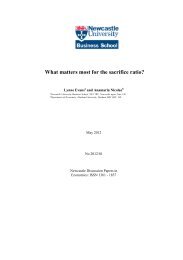www.liv.ac.uk/careers Examples of PGCE personal statements
www.liv.ac.uk/careers Examples of PGCE personal statements
www.liv.ac.uk/careers Examples of PGCE personal statements
Create successful ePaper yourself
Turn your PDF publications into a flip-book with our unique Google optimized e-Paper software.
<strong>Examples</strong> <strong>of</strong> <strong>PGCE</strong> <strong>personal</strong> <strong>statements</strong><br />
The purpose <strong>of</strong> a <strong>personal</strong> statement is to inform the te<strong>ac</strong>her training provider about your relevant skills, knowledge<br />
and experience for a career in te<strong>ac</strong>hing and to persuade the admissions tutor to <strong>of</strong>fer you an interview.<br />
Before applying, do your research. Find out what being a te<strong>ac</strong>her is really like. Get experience in a school, talk to<br />
te<strong>ac</strong>hers and read <strong>careers</strong> information. Find out what skills are required and give evidence <strong>of</strong> how you can<br />
demonstrate the skills requires. Our leaflet “Getting started in te<strong>ac</strong>hing” can give you links to useful sources and<br />
ways to get experience. Copies are available in the Careers & Employability Service and on our website.<br />
Your <strong>personal</strong> statement<br />
The GTTR form is an online application. The <strong>personal</strong> statement section gives you just 47 lines in which to impress<br />
the admissions tutor! The section asks you to:<br />
Describe briefly your reasons for wanting to te<strong>ac</strong>h, giving the relevance <strong>of</strong> your previous education and experience,<br />
including te<strong>ac</strong>hing, visits to schools and other work with young people.<br />
Ensure you give evidence <strong>of</strong> your experiences and education to support your <strong>statements</strong>.<br />
Think about what skills make an effective te<strong>ac</strong>her. Which <strong>of</strong> these skills do you have?<br />
Reflect on what you have observed in any work experience in state schools.<br />
o How did the te<strong>ac</strong>her manage the class, set different tasks, assess work, work with other staff?<br />
o Give examples <strong>of</strong> what you did. What did you learn from it?<br />
What else have you done to show you enjoy working with young people or children? In a team? With<br />
parents?<br />
Comment on work experience in other settings, such as voluntary work and extr<strong>ac</strong>urricular <strong>ac</strong>tivities, and<br />
show how the skills you gained will help you become an effective te<strong>ac</strong>her.<br />
State how the skills gained from your undergraduate degree will help you in the classroom.<br />
Reflect on what subject knowledge you have, how you developed it and how it is relevant to the national<br />
curriculum.<br />
Include language skills, including community languages such as Urdu or Punjabi.<br />
Don’t forget your interests, like photography, ICT, sport, drama or music that can link into school experience.<br />
Include skills you have gained in other employment.<br />
Show that you understand that it is a challenging pr<strong>of</strong>ession......but that it is a rewarding one.<br />
Skills for the te<strong>ac</strong>hing pr<strong>of</strong>ession that you can add in to your statement:<br />
an ability to relate to young people;<br />
good inter<strong>personal</strong> and listening skills;<br />
the cap<strong>ac</strong>ity to be alert, creative, imaginative, energetic and enthusiastic;<br />
an ability to be adaptable and versatile;<br />
a sense <strong>of</strong> responsibility and reliability;<br />
an ability to work with others;<br />
good time management and organisational skills;<br />
ability to cope with pressure;<br />
resilience, motivation and ten<strong>ac</strong>ity; and<br />
a desire for self-development.<br />
Avoid saying: I like children. I have always wanted to be a te<strong>ac</strong>her. I want to te<strong>ac</strong>h because I love my subject. Your<br />
evidence should show this.<br />
Further information on completing a <strong>personal</strong> statement is available from:<br />
TDA website <strong>www</strong>.tda.gov.<strong>uk</strong>/Recruit/thetrainingprocess/makingyourapplication/applicationassistant.aspx<br />
Graduate Prospects <strong>www</strong>.prospects.<strong>ac</strong>.<strong>uk</strong>/links/pgce<br />
National Curriculum Online http://curriculum.qca.org.<strong>uk</strong>/<br />
AGCAS leaflet “applying for a <strong>PGCE</strong>” available in the Careers & Employability Service and on our website.<br />
<strong>www</strong>.<strong>liv</strong>.<strong>ac</strong>.<strong>uk</strong>/<strong>careers</strong>
<strong>Examples</strong> <strong>of</strong> <strong>personal</strong> <strong>statements</strong><br />
Primary (example 1)<br />
I believe te<strong>ac</strong>hing is an essential pr<strong>of</strong>ession and that those in it, along with a school’s support staff, have a great<br />
responsibility as educators. Te<strong>ac</strong>hing will <strong>of</strong>fer me the challenge and diversity I seek from my career. I feel I have the<br />
right abilities to make that difference in a young person’s life. I also feel I possess the skills that will enable me to<br />
make a positive contribution to te<strong>ac</strong>hing.<br />
I have had pl<strong>ac</strong>ements in 2 schools, Liverpool High School and St Helen’s Primary School. Having worked within both<br />
primary and secondary age groups I have found that I got more enjoyment dealing with the formative years. I felt<br />
more satisf<strong>ac</strong>tion at seeing younger children grasp the fundamentals behind a topic. For example how a particular<br />
student with encouragement and patience can come to terms with the idea <strong>of</strong> doubling and halving or how easy it<br />
was for the students in year 9 to use a search engine to find out f<strong>ac</strong>ts in an I.T. lesson. I particularly enjoyed the<br />
results <strong>of</strong> instilling confidence and self belief in students, seeing them feel they can <strong>ac</strong>hieve and should try to do so.<br />
Watching the te<strong>ac</strong>hers at work has illustrated that children respond differently to a variety <strong>of</strong> te<strong>ac</strong>hing methods. I<br />
observed that a te<strong>ac</strong>her’s appro<strong>ac</strong>h to the class can have a pr<strong>of</strong>ound effect on the learning ability <strong>of</strong> those children.<br />
The te<strong>ac</strong>her constantly changed the way she taught the class to maintain their interest and focus on <strong>ac</strong>tivities. She<br />
encouraged and praised children who were finding <strong>ac</strong>tivities difficult giving them confidence to try and in many<br />
cases <strong>ac</strong>hieve. Her positive attitude towards the children gave them belief in themselves leading to a positive<br />
learning environment. These experiences have also opened my eyes to the demands put on te<strong>ac</strong>hers outside the<br />
classrooms: the struggle for financing, pressures on time management and dealing with the te<strong>ac</strong>her/ parent<br />
relationship. There are also clerical duties, which need to be completed whilst not taking away from the te<strong>ac</strong>her’s<br />
effectiveness within the classroom, which is where I believe they make the greatest difference<br />
Providing this variety represents a huge challenge in an environment with more than thirty pupils, but I am confident<br />
that it is a challenge I will be able to meet. Through my role as an admin assistant for my local council and through<br />
being secretary <strong>of</strong> a drama society I have developed the skills which will enable me to cope with the challenges<br />
f<strong>ac</strong>ing those in the te<strong>ac</strong>hing pr<strong>of</strong>ession. I have learnt to be organized and to manage my time in order to meet the<br />
demands <strong>of</strong> my degree and extra-curricular <strong>ac</strong>tivities. I also ensure that in all my roles I communicate with colleagues<br />
in an appropriate manner.<br />
My studies to date have given me a firm grasp <strong>of</strong> my subject, examining the ancient history <strong>of</strong> several civilisations<br />
(including Greece, Rome, Egypt and ancient Britain) which are all relevant to the national curriculum for Key stages 1<br />
and 2. I was also required to study literature and extrapolate relevant information as a core part <strong>of</strong> my course which<br />
coupled with my previous experience at GCSE and A level has given me a good grasp <strong>of</strong> English. A module <strong>of</strong> my<br />
course together with my current employment has also developed my computer skills.<br />
I would like to make a contribution to the wider school community by continuing my interests in sports and music. I<br />
have played netball throughout my time at school and university and feel that sports in schools are essential as they<br />
encourage team work, as well as being crucial for health and fitness. I have qualifications in flute and saxophone and<br />
would welcome the opportunity to develop pupils’ musical education.<br />
From my experience I have seen that te<strong>ac</strong>hing provides extensive and sometimes exhausting challenges for which<br />
the rewards more than justify the effort. It is a pr<strong>of</strong>ession which I would relish, giving me the chance to make a<br />
difference in the <strong>liv</strong>es <strong>of</strong> others at their most impressionable.<br />
Primary (example 2)<br />
I am passionate about te<strong>ac</strong>hing children and my extensive experience in a classroom environment has demonstrated<br />
that I will find working with children extremely rewarding and that I would be well suited to being a primary school<br />
te<strong>ac</strong>her. My studies to date have given me a firm grasp <strong>of</strong> my subject, examining the ancient history <strong>of</strong> several<br />
civilisations (including Greece, Rome, Egypt and ancient Britain) which are all relevant to the national curriculum for<br />
Key stages 1 and 2. I was also required to study literature and extrapolate relevant information as a core part <strong>of</strong> my<br />
course which coupled with my previous experience at GCSE and A level has given me a good grasp <strong>of</strong> English. A<br />
module <strong>of</strong> my course together with my current employment has also developed my computer skills.<br />
I have a good understanding <strong>of</strong> core subjects including Mathematics, English and Science and feel that I would be<br />
able to convey these subjects to children in a creative, enjoyable and exciting way.
I have had two periods <strong>of</strong> relevant classroom experience since 2008. I have had a total <strong>of</strong> five weeks experience as a<br />
Classroom Assistant in Liverpool Primary School where I worked with a mixed class <strong>of</strong> year 1 and year 2 children.<br />
Within this role I listened to pupils reading one to one, supervised smaller groups within the classroom situation to<br />
complete set tasks and helped the children to complete work in the classroom.<br />
Between March and June 2009 I undertook a position as a classroom assistant in St Gregory’s, a challenging<br />
Liverpool primary school, for an afternoon a week. I was working with a mixed class <strong>of</strong> year 5 and 6 pupils, assisting<br />
the Te<strong>ac</strong>her in the classroom with all lessons. I also helped to supervise the children on a trip to a local art gallery<br />
which they very much enjoyed. I found the contrast between this school and the other primary school I have had<br />
experience in interesting, and found that different styles <strong>of</strong> te<strong>ac</strong>hing were used for different children. Attending the<br />
school over a long period <strong>of</strong> time enabled me to see the development <strong>of</strong> the children in the class. Many <strong>of</strong> them<br />
were working towards their SAT exams and I saw them develop their skills during the time I was working with the<br />
class.<br />
These experiences have shown me the demands put on te<strong>ac</strong>hers both inside and outside the classrooms, for<br />
example pressures on time management, dealing with the parents and undertaking administrative duties, whilst still<br />
maintaining effectiveness within the classroom. Through my roles both as a classroom assistant and events organiser<br />
for a small charity I have developed these skills which will enable me to cope with the challenges f<strong>ac</strong>ing those in the<br />
te<strong>ac</strong>hing pr<strong>of</strong>ession.<br />
I am a confident person, with good communication skills. I am organised and punctual, qualities which I feel would<br />
be vital to both the <strong>PGCE</strong> course and the role <strong>of</strong> a te<strong>ac</strong>her.<br />
Secondary (Modern Languages)<br />
I have been interested in a career in te<strong>ac</strong>hing for some years and over the last year in particular have endeavoured<br />
to develop the qualities necessary to be a successful te<strong>ac</strong>her and now believe I am in a position to develop as a<br />
Spanish and French te<strong>ac</strong>her within the framework <strong>of</strong> a <strong>PGCE</strong>.<br />
Modern Languages is a subject that can be immensely rewarding for children at all levels and an extremely relevant<br />
life skill in the modern world. Secondary level is particularly crucial for both developing the ability <strong>of</strong> pupils to<br />
complete basic linguistic tasks as well as stimulating their interest to pursue their study <strong>of</strong> language further. With<br />
Spanish and French no longer compulsory at Key Stage 4 it is essential that language te<strong>ac</strong>hers can convey the<br />
excitement <strong>of</strong> learning languages and maximise their <strong>ac</strong>cessibility to students.<br />
I hope to be able to convey my own passion for languages in a context that will appeal to the diverse age groups in<br />
secondary schools. This will require a number <strong>of</strong> core skills. Observing lessons and discussions with a number <strong>of</strong><br />
te<strong>ac</strong>hers has emphasised the importance <strong>of</strong> class room management. Having co<strong>ac</strong>hed football to groups <strong>of</strong> children<br />
during my time in Latin America I have an understanding <strong>of</strong> the balance required between maintaining discipline<br />
without stifling individuals.<br />
I am qualified as an FA level 1 football co<strong>ac</strong>h and a number <strong>of</strong> the skills integral to that course will be beneficial in a<br />
classroom environment. These include Child Protection, Best Pr<strong>ac</strong>tice and perhaps most importantly the ability to<br />
plan lessons and evaluate your own performance and that <strong>of</strong> the children. This is vital to ensure a consistent<br />
provision <strong>of</strong> quality structured lessons. Watching language te<strong>ac</strong>hers at work has also illustrated that children<br />
respond differently to a variety <strong>of</strong> te<strong>ac</strong>hing methods. Providing this variety represents a huge challenge in an<br />
environment with more than thirty pupils, but I am confident that is a challenge I will be able to meet.<br />
After four years at university studying Spanish, I believe that my technical level is such that I could te<strong>ac</strong>h pupils up to<br />
and beyond A Level standard. As well as a class room education in the subject I have used Spanish extensively in<br />
different situations during a year in Argentina undertaking research for my dissertation, 3 months travelling in South<br />
America during my gap year and a number <strong>of</strong> trips to Spain.<br />
I also have an A level in French which will enable me to <strong>of</strong>fer a second subject as a language te<strong>ac</strong>her. I read French<br />
language newspapers and watch French language films in order to improve my knowledge and understanding <strong>of</strong> the<br />
language and I am confident that I will be able to te<strong>ac</strong>h French alongside Spanish as part <strong>of</strong> the school curriculum.<br />
I hope to contribute fully to school life and to continue co<strong>ac</strong>hing sports. As not all students learn languages formally<br />
I would welcome the opportunity to run language clubs so all students can enjoy learning about language and<br />
culture in an informal setting. I would also hope to take a role in drama productions, something I enjoyed greatly<br />
during my own time at school and sixth form.
I understand the challenges <strong>of</strong> te<strong>ac</strong>hing as both my mother and grandfather taught but I am confident that I possess<br />
the ability to meet these demands and pursue this rewarding career.<br />
Secondary (English)<br />
I believe that te<strong>ac</strong>hing is an essential pr<strong>of</strong>ession and that those in it have a great responsibility in their role as<br />
educators. I come from a te<strong>ac</strong>hing b<strong>ac</strong>kground; my father is a retired foreign languages te<strong>ac</strong>her, so from an early<br />
age I have known what it entails to be a te<strong>ac</strong>her.<br />
My first experience <strong>of</strong> working with children came in 2007, when for two weeks I worked as a Classroom Assistant in<br />
Liverpool Primary School. I spent this time with a Year 2 class undertaking a number <strong>of</strong> responsibilities; I worked<br />
both individually and with small groups <strong>of</strong> children, helping with reading, writing and arithmetic. On a day trip to a<br />
zoo I was in charge <strong>of</strong> a group <strong>of</strong> approximately five children. As I am a keen artist, the te<strong>ac</strong>her allowed me to create<br />
a number <strong>of</strong> different things with the class. These two weeks gave me the basic understanding <strong>of</strong> a working<br />
classroom and the knowledge that working with and educating children would be something that I would like to<br />
continue in future.<br />
When I was in my second year I went on the Student Tutoring Scheme where I gained experience working with<br />
pupils in Key Stage 3 and 4. I was a supervisor at break and lunchtimes and had to ensure that the pupils were in a<br />
safe environment. As I attended a weekly boarding school, every evening I also supervised a group <strong>of</strong> pupils <strong>of</strong><br />
varying ages taking prep, making sure they worked and helped them if this was needed. I found these<br />
responsibilities satisfying, as, although it was sometimes hard work, I gained the respect <strong>of</strong> those I worked with, and<br />
I was able to develop a good rapport with them. During this time I also worked in the school <strong>of</strong>fice and so have<br />
experience <strong>of</strong> the clerical duties involved within a school environment.<br />
My studies have covered a wide range <strong>of</strong> the content involved in te<strong>ac</strong>hing this subject at Key Stages 1 and 2. As well<br />
as my degree broadening my knowledge <strong>of</strong> grammar, literature, and drama I have demonstrated my communication<br />
skills through giving presentations, both individually and in groups. I feel that I now have excellent writing skills, and<br />
that I am good at picking up mistakes in the work <strong>of</strong> others. Furthermore, I took the ‘Introduction to Te<strong>ac</strong>hing English<br />
as a Foreign Language’ module, which gave me a further insight into te<strong>ac</strong>hing; within this I learnt more about<br />
te<strong>ac</strong>hing strategies and lesson plans. Through my degree I also gained time management, organisation skills and<br />
computer skills; all important qualities for a te<strong>ac</strong>her to have.<br />
I would like to make a contribution to the wider school community by continuing my interests in sports and art. I<br />
have played netball throughout school and University, and feel that sports in schools are essential as they encourage<br />
teamwork, as well as being crucial for health and fitness. I am a keen artist and would be happy to continue this<br />
interest through my role as a te<strong>ac</strong>her; whether it is running art clubs or helping out with school plays.<br />
I understand that the responsibilities <strong>of</strong> a te<strong>ac</strong>her do not just end with the school day, and that there are many other<br />
issues that must be dealt with. From previous experience I have seen that te<strong>ac</strong>hing provides extensive and<br />
sometimes exhausting challenges, but feel that the rewards far outweigh the negatives and I look forward to being<br />
able to contribute to this pr<strong>of</strong>ession.<br />
Secondary (Maths)<br />
Te<strong>ac</strong>hing will <strong>of</strong>fer me the challenge and diversity I seek from my career. I feel I have the right abilities to make that<br />
difference in a young person’s life. I also feel I possess the skills that will enable me to make a positive contribution<br />
to te<strong>ac</strong>hing.<br />
I have always enjoyed and excelled at Maths, gaining a grade A at A level and a 2.1 at degree level. Maths is<br />
important in everyday life, which is why it is an important subject to learn. I love the f<strong>ac</strong>t that we use maths in many<br />
<strong>of</strong> our day-to-day simple decisions (i.e. from buying a bus ticket to buying a house). It is a problem solving subject<br />
which I enjoy doing and my enthusiasm for the subject will be reflected in my ability to pass my knowledge on.<br />
Since 2006 when I volunteered for Community Volunteers I realised that I enjoyed working with young people.<br />
Active8 is a program run every year, for two weeks by North Moors Youth Club during the summer. I worked as a<br />
coordinator <strong>of</strong> a few mini tournaments for the 11 – 16 years old to participate in. I had to apply my supervisory skills<br />
to ensure no problems arose and when a problem occurred I then dealt with the situation in a calm manner to<br />
ensure a happy outcome.<br />
In May 2008 I was invited to observe lessons at St Mary’s High School. I found this extremely valuable because it<br />
gave me a true insight into te<strong>ac</strong>hing and classroom life. I realised that there is a need to get the attention <strong>of</strong> the class<br />
and maintain it for a successful lesson. The ability to control the class is important to allow everyone the opportunity
to learn without disruption. I have just started to volunteer as a student tutor; this gives me more experience within<br />
a classroom. It has also allowed me to see the level <strong>of</strong> maths that should be attained by e<strong>ac</strong>h key stage ability.<br />
In 2007 I worked as an exam invigilator at North Moors College which was a good insight into examination processes.<br />
It also showed me the type <strong>of</strong> pressures and problems that exams have on young people.<br />
Communication is an important aspect <strong>of</strong> te<strong>ac</strong>hing; I have developed this skill from working at Brighton Summer<br />
School in July 2008. I worked as an assistant in the summer holidays) and had to inter<strong>ac</strong>t with the te<strong>ac</strong>hers and help<br />
run the different <strong>ac</strong>tivities. In August 2009 I was again an assistant at the summer school. This time I was given the<br />
opportunity to invent an idea for an <strong>ac</strong>tivity for the children. It had to be based on maths and the environment, with<br />
an aim to produce evidence <strong>of</strong> the work the children did. I needed to be very patient whilst working with the<br />
children especially when helping with any problems with the maths. I needed to think on my feet when trying to<br />
solve these problems and try to explain concepts in a different way. At this summer school I took on more<br />
responsibilities and this involved sorting out problems between the children when they arose this involved using<br />
good listening skills and an ability to be very diplomatic.<br />
Since I have been at university I have gained excellent time management skills especially when I have been working<br />
to supplement my income. This year I have taken on the role <strong>of</strong> organising special events for my course like the<br />
initiation get together and the Christmas Dinner. I enjoy this role because I feel it is important to keep control on<br />
how things are progressing and to make sure that delegation <strong>of</strong> responsibilities occurs if required.<br />
I feel that my enthusiasm for Maths and the skills I have gained through my degree and classroom experience can<br />
contribute to a young person’s learning. I am willing to continue to work very hard to become an excellent te<strong>ac</strong>her.<br />
The Careers & Employability Service<br />
Get in touch; ask questions, we’re here to help. We’re located on the first floor <strong>of</strong> the Student Services Centre, next<br />
to the Guild <strong>of</strong> Students. You can also find us in Careers Express in the courtyard <strong>of</strong> the Guild <strong>of</strong> Students.<br />
Call in, give us a call, drop us an email or visit our website if there’s anything<br />
else you need to know.<br />
Careers & Employability Service<br />
University <strong>of</strong> Liverpool<br />
Tel: 0151 794 4647<br />
Email: <strong>careers</strong>@<strong>liv</strong>.<strong>ac</strong>.<strong>uk</strong><br />
<strong>www</strong>.<strong>liv</strong>.<strong>ac</strong>.<strong>uk</strong>/<strong>careers</strong><br />
Visit our website for our latest opening hours.<br />
© University <strong>of</strong> Liverpool Careers & Employability Service, August 2010.<br />
This document is available in alternative formats. Please ask us for details.<br />
You are advised to check material f<strong>ac</strong>ts. We try to ensure that information given is up-to-date but we are aware that<br />
information is subject to change. Any links are used to provide further information and are not intended to signify<br />
that we endorse such websites and/or their content.


